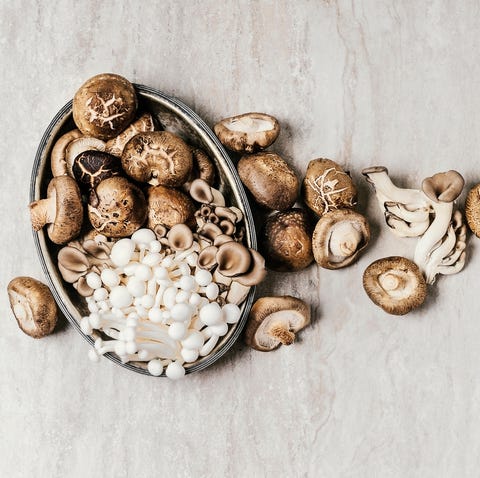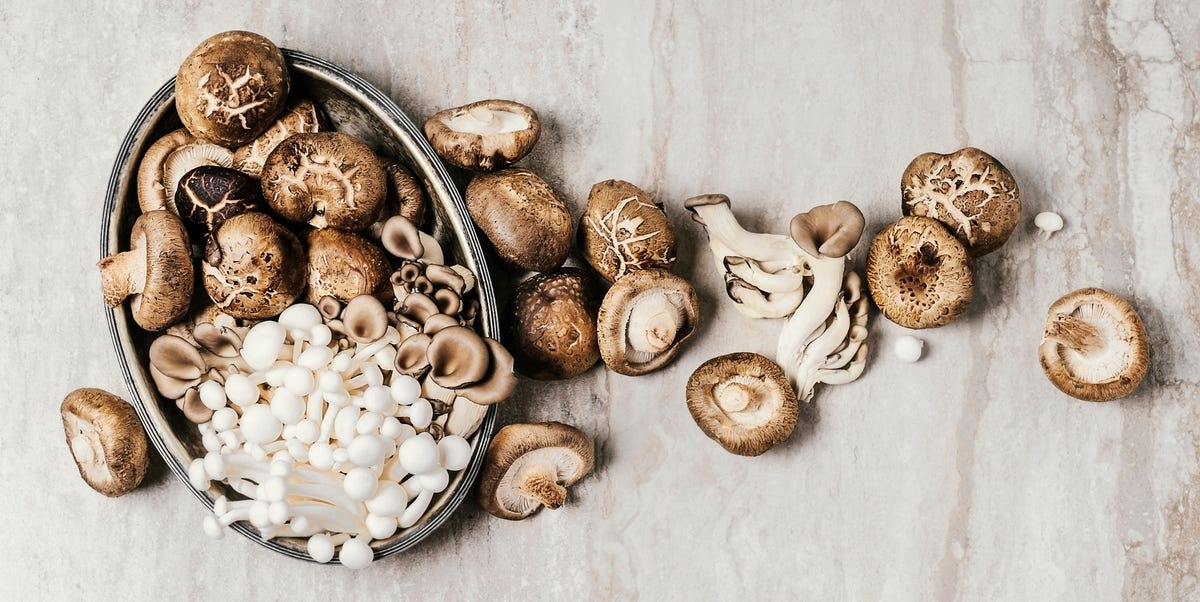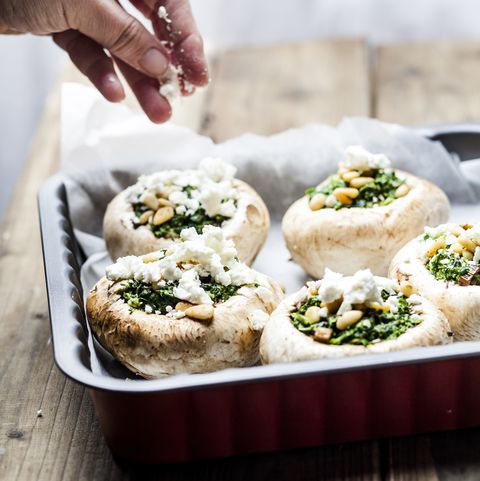
Claudia TotirGetty Images
When it comes to choosing nutrient-rich ingredients for your meals, plain old white-colored food — think white bread, white rice and white pasta — don’t have the healthiest rep. But there is a white-colored treat that you should pile on your plate: mushrooms!
Whether in a spinach salad, sautéed in a stir-fry or folded into an omelet, mushrooms are a nutty-flavored, nutrient-packed treat, says Florida-based nutritionist Maryann Walsh, RD. “Mushrooms contain selenium and ergothioneine, which are potent antioxidants,” Walsh explains. “They also contain b vitamins and copper, which all support red blood cell development.”
“Although white foods are often thought to be nutrient-poor, mushrooms are an exception,” adds Mitzi Dulan, RD, author of The Pinterest Diet. “They contain many minerals, like selenium, potassium, copper, iron and phosphorus, that are not often found in plant-derived foods.”
Another great thing about mushrooms — there are so many interesting textures and flavors to try, from dense, meaty portobellos, to earthy hen-of-the-woods, to delicate chanterelles. “All mushrooms boast an impressive nutrient profile, so while some may be celebrated over others, at the end of the day you can reap the benefits by choosing whatever is available at your local grocery store, fits into your budget, and makes the most sense with the recipe you’re cooking,” says Walsh.
Here are seven compelling reasons why mushrooms pack a powerful punch when it comes to improving your health:
1. Mushrooms may help keep you young.
Mushrooms contain a super-high concentration of two antioxidants, ergothioneine and glutathione, according to a 2017 Penn State study. When these antioxidants are present together, they work extra-hard to protect the body from the physiological stress that causes visible signs of aging (translation: wrinkles).
2. Mushrooms can protect your brain as you age.
A long-term study from Spain published in 2021 found that certain foods rich in polyphenols (which include mushrooms, as well as coffee, cocoa, and red wine) may be protective against cognitive decline in older adults. Penn State researchers also found that the antioxidants ergothioneine and glutathione may help prevent Parkinson’s and Alzheimer’s. They recommend eating at least five button mushrooms per day to reduce your risk of neurological illness in the future. Cook the ‘shrooms to best preserve their nutritional benefits, either by microwaving or grilling.
3. Mushrooms can lift your mood.
Penn State researchers did some further investigations in 2021 and found that in a sample of almost 25,000 people, those who regularly ate mushrooms had a lower risk for depression. Once again, this may be due to ergothioneine, which may lower the risk of oxidative stress, which in turn reduces symptoms of depression, the authors suggest. They recommend eating button mushrooms, which contain potassium, which may help reduce anxiety.
4. Mushrooms may boost your memory.
Another mental mushroom-related benefit: Researchers at the National University of Singapore found that eating two 3/4 cup servings of cooked mushrooms per week may reduce your odds of mild cognitive decline in a 2019 study.
5. Mushrooms can help your heart health.
Mushrooms help recipes taste better in place of salt because they contain glutamate ribonucleotides. Those compounds contribute a savory, umami taste with no ramifications for your blood pressure or heart disease risk. An entire cup of mushrooms has only 5 mg sodium! Mushrooms also make an excellent, satisfying substitute for red meat in any dish, eliminating calories, fat, and cholesterol from the equation.
6. Mushrooms can assist in strengthening your bones.
At the supermarket, grab a package marked “UVB”. How come? “Mushrooms that are grown outside in UV light (as opposed to those grown in the dark) are a good source of vitamin D,” Walsh explains. These UVB-labeled mushrooms have converted a compound called ergosterol directly into vitamin D. This means by eating just 3 ounces of UVB-exposed mushrooms, you’ve met your daily vitamin D requirement and given your bone health a leg up.
7. Mushrooms will help give you energy.
Mushrooms are rich in B vitamins: riboflavin [B2], folate [B9], thiamine [B1], pantothenic acid [B5] and niacin [B3]. These help the body utilize energy from the food we consume and produce red blood cells, which carry oxygen throughout the body.
How to Eat More Mushrooms
What are some simple swaps that work more mushrooms into your daily meals? Dulan and Walsh offer the following suggestions:
- Chop mushrooms to match the consistency of ground beef and then blend them into the meat you’re cooking for lunch or dinner. This is a quick and easy way to incorporate mushrooms into your favorite burgers.
• Use a large, flat portobello in place of a burger, or serve it as a low-carb “pizza crust” by topping it with sauce, cheese, and your favorite toppings (perhaps more mushrooms?). - Cut up a small mushroom and mix it in to omelets, quiches, or scrambled eggs at breakfast or brunch.
- Slice some mushroom into your pasta sauce. Mushrooms can also add great flavor and texture to nearly any side dish.
“Mushrooms may be overlooked sometimes due to their lack of vibrant colors like the other veggies out there, but they truly are a nutrition powerhouse, especially in times like these, where immune-boosting nutrients are at the top of everyone’s mind,” says Walsh.
“It’s crucial to distinguish between mushrooms are that are safe and those that aren’t,” Dulan stresses. “Avoid eating mushrooms that are from the wild. They can be toxic and lead to serious illness and in some cases, death.” Play it safe and source your mushrooms from the easiest place — the grocery store!
This content is created and maintained by a third party, and imported onto this page to help users provide their email addresses. You may be able to find more information about this and similar content at piano.io


